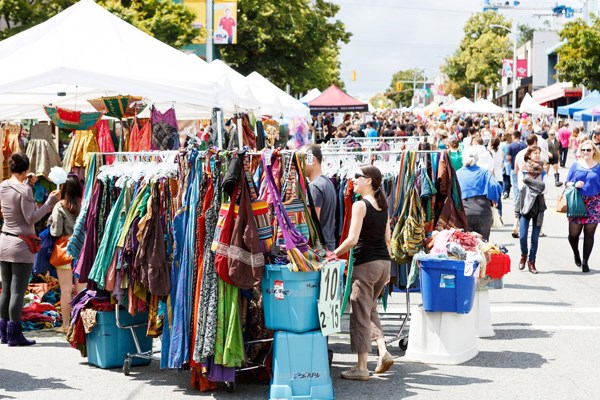Recycling educators from the city will be monitoring and documenting the waste stations on West and Fourth Ave to detect how “green” the event is.
“We work closely with the city when we do outdoor public events,” said Katie Schaeffers from brand.LIVE, which helps organize the festival. “There are 50,000 people on one street and managing waste is a big task. The Green City Action Plan came to us… The city has a project to be the greenest city in the world by 2020 so they are trying to get people to work on the action plan with them.”
Karyn Magnusson, an engineer from the City of Vancouver, said Khatsahlano is the first group it’s connected with but hopes to engage three or four more events this summer. In the past, volunteered-based events have had a strong mandate for reducing waste, but this year was a change for the organizers.
“This is the first year where the city has stepped forward with this particular pilot project,” said Schaffers. “It’s more than implementing, they are monitoring.”
Events such as the Vancouver Folk Music Festival and EPIC: The Sustainable Living Festival have long employed “green” techniques of waste management such as setting up recycle stations and encouraging the usage of reusable bags. Now Khatsahlano is joining the green focus.
Public education and visibility are the main components for the initiative, said Schaffers.
“[Khatsahlano] is more comprehensive, there’s a real drive to make this really visible. So often when you go to events you see overflowing garbage cans and so many recyclables don’t get put into the right places. It’s an education process to show people it’s easy to recycle,” she said.
Two multistep stations will be set up and the green event team organizers will design where the stations will go based on food service and high traffics areas. Certain waste stations will be monitored, while others will be left alone, for measuring and evaluating success. The idea is to sort what gets thrown away and compare containers.
“We will specifically target a divergence with separating wastes,” said Magnusson. “The focuses are on water consumption and transportation modes, and we have real tools to perform better for our objectives.”
A data report will be created after the festival by UBC master’s student Annie Merritt to see what worked and what didn’t. A comparison of the differences between monitored and unmonitored stations will be examined.
“In terms of challenges there is the education process,” Schaeffers said. “It may take a few seconds longer for people to decide where your bottle or can would go. I think by having well-trained volunteers it makes it that much easier for guests and the people involved in the festival.”
More details at khatsahlano.com.



